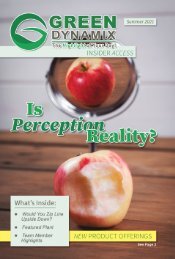Spring 2020
How To Live With No Regrets: Importance of Tone, New Faces, UPS Ground Cover
How To Live With No Regrets: Importance of Tone, New Faces, UPS Ground Cover
- No tags were found...
You also want an ePaper? Increase the reach of your titles
YUMPU automatically turns print PDFs into web optimized ePapers that Google loves.
The Importance of Tone<br />
This essay came in our inbox the other day, and we thought we’d share an excerpt of it. The author is<br />
Robert Rose from the Content Marketing Institute.<br />
After 26 years of marriage, there are<br />
very few things my wife Elizabeth<br />
and I still fight about. But when we<br />
do fight, it’s rarely about something<br />
one or the other said, but rather the<br />
way it was said.<br />
It’s really not the tone itself that<br />
causes the argument. It’s the<br />
meaning the listener infers from<br />
the speaker’s tone – which might<br />
or might not be the actual meaning<br />
that was intended. I can tell you<br />
from experience that my first name<br />
can mean many things, depending<br />
on the tone in which it’s said.<br />
Beyond communicating meaning,<br />
tone of voice also contains strong<br />
signals about who we are and<br />
whether we’re believable. Audiences<br />
can pick up on clues about where<br />
speakers (and writers) are from, their<br />
education level, age, values, sincerity,<br />
and authority simply from their<br />
tone.<br />
Of course, it’s possible to misinterpret<br />
every one of those things.<br />
That’s where the depth of trust<br />
between speaker and listener is<br />
helped by using a variety of tones of<br />
voice. As Stephen M. R. Covey said<br />
in his book The Speed of Trust, “In a<br />
high-trust relationship, you can say<br />
the wrong thing, and people will get<br />
your meaning. In a low trust relationship,<br />
you can be very measured,<br />
even precise, and they’ll still misinterpret<br />
you.”<br />
How we speak, listen, and associate<br />
meaning with communication is<br />
influenced by our experience and<br />
our recognition of tonal patterns.<br />
When brand communicators<br />
struggle with what to say, it’s not<br />
that we’re always seeking the right<br />
words. It may be because we don’t<br />
have the right way to say it. If we<br />
work on developing multiple tones<br />
of voice, we’ll develop deeper<br />
trust with our audiences. And then<br />
everything from the goofiest tweet<br />
to communicating the actions we’re<br />
taking in a global crisis will land better<br />
– both because of what we say<br />
and the way we choose to say it.<br />
It’s your story. Tell it well.<br />
2















